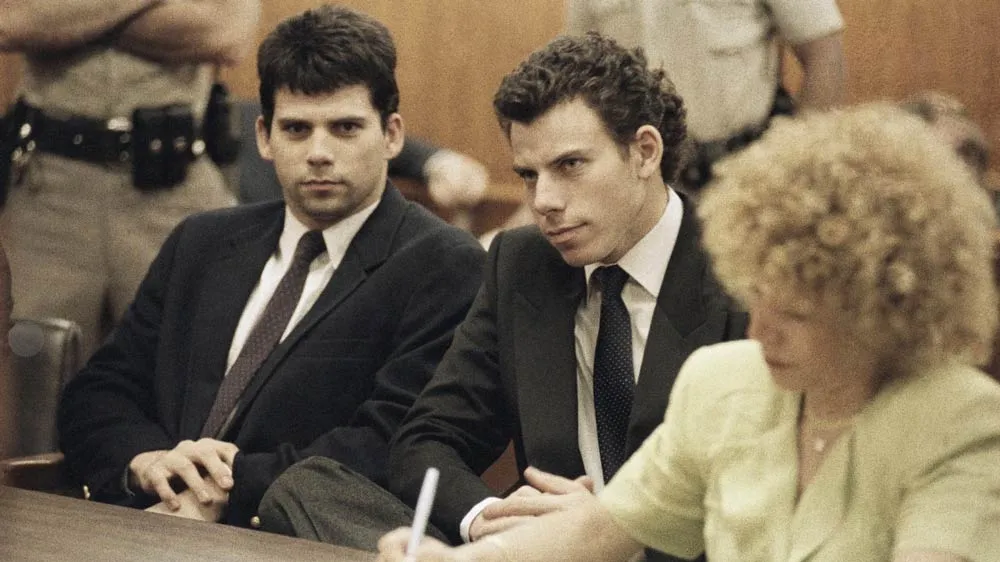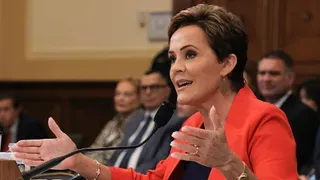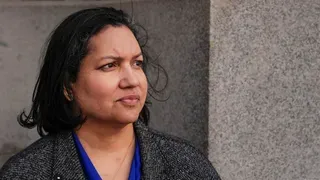October 17, 2011
OutServe Conference Draws Hundreds of Gay Soldiers to Las Vegas
Shaun Knittel READ TIME: 6 MIN.
In the wake of the repeal of 'don't ask, don't tell,' the first-ever conference sponsored by active-duty LGBT servicemembers took place in Las Vegas from Oct. 13-16.
The OutServe Armed Forces Leadership Summit welcomed more than 200 LGBT and straight military members, veterans, spouses, partners and allies to join workshops and meetings at New York New York hotel and casino. Topics included leadership, family, faith, unique challenges faced by servicewomen and lessons on open service from military allies-all with the objective of strengthening the American military.
OutServe, an association of actively serving LGBT military personnel that launched in 2010, boasts more than 4,000 members and 40 plus chapters worldwide. It is one of the largest LGBT employee resource groups in the world. And it works to support a professional network of LGBT military personnel to create an environment of respect in the armed forces with regard to sexual orientation and gender identity.
"Diversity is rightly viewed by the military as a force multiplier," said Air Force First Lt. Josh Seefried, who is co-director of OutServe. "All of us in the armed forces share the same mission, and by taking advantage of our unique differences and points of view, we become stronger."
Seefried said gay troops who can now serve openly need to be leaders for the next generation of servicemembers. "For years, we were painted as soldiers who would put other soldiers at risk if we served openly," he said. "If we remain invisible, we remain at risk."
OutServe board members and chapter leaders on Friday, Oct. 14, met in a conference leading into the leadership summit. This meeting was the first time that most members of the online-based organizations had met in person.
"After working together online for so long, there was an instant connection," said Air Force Staff Sgt. Joshua Engle, one of 49 chapter leaders worldwide. "We had a lot of agreement about where we want to go, and how we wanted to help the OutServe organization and the military."
"What we did will help the military be more inclusive, and will strengthen unit cohesion," added Air Force Maj. Jeffrey Mueller. "When the military asks us for input on what might be done differently, as they do with similar organizations, we will have well-thought out recommendations to present."
In addition to a number of active-duty attendees, gay former military officers Air Force Lt. Col. Victor Fehrenbach, Navy Cmdr. Zoe Dunning, Air Force Maj. Mike Almy, and Army Capt. Jonathan Hopkins spoke with attendees about leading troops while being "out." Kristen Kavanaugh, founder of the Military Acceptance Project who graduated from the Naval Academy, joined an active-duty military psychologist to provide resources for servicemembers and their partners who are separated by deployment, or need support for other issues. Chaplains from the Forum on the Military Chaplaincy spoke about pluralism and professionalism in the chaplaincy. And former Marine Capt. Anu Bhagwati of Service Women's Action Network presented information on the special concerns of military women.
"This is very much a series of working sessions," said former Army Capt. Jonathan Hopkins, a decorated veteran of Iraq and Afghanistan. "DADT is done; now let's get to work on getting the most out of every individual through that environment of respect."
Doug Wilson, assistant secretary of defense for public affairs and the highest-ranking openly gay civilian working at the Pentagon, delivered the keynote address and a message of congratulations from First Lady Michelle Obama.
"It's time to live by the words we have spoken so often over the last 17-plus years: Sexual orientation does not define us," Wilson told the crowd. "We all have the right to define ourselves."
Gay Troops: Coming Out to Command Not a Problem
Each of the 200 or so sailors, soldiers, Marines and airmen who attended the conference said they only recently came out to their command and coworkers. Not one of them reported getting a reaction worse than a shrug.
"Out of the 4,500 members we have, we haven't had any person come to us about one single problem, which is huge, because right before repeal of DADT we had tons of problems," said Seefried. "But right now, after Sept. 20, there is nothing to relay because everything has been 100 percent positive."
Senior Airman Kody Parsons said he came out to his command just one week ago. He did so, he said, because he thought he should let his command know that he was attending the OutServe conference. The reaction from his commanders was one of support. Parsons, who works as a substance abuse counselor at an Air Force base in California, said his command leadership thanked him for speaking up and asked if there was anything they could do to help. Parsons called it "a nonevent."
"I think it's very important to ensure nothing changes for fear of reinforcing the stigma that, 'Well now that the gays are here, look out," he said, noting his sexual orientation has no effect on his ability to do his job. Parsons' command recognizes that.
"Revealing one's sexual orientation is an important step," said Michelle Benecke, a former Army battery commander who left the military before DADT was enacted, adding, "but one that can also produce problems such as tokenism."
She said no one should presume to tell anyone else when and how to make such a personal decision.
"I want to acknowledge up front everybody is kind of in a different place," said Benecke, who co-founded the Servicemembers Legal Defense Network. "There are folks that have to go through their own process and have to come to their own conclusions for their own safety and their own circumstances."
Challenges Still Exist
"With the repeal of 'don't ask, don't tell' behind us, it's time to take the next steps for equality, including an executive order from President [Barack] Obama that would prohibit discrimination in the ranks on the basis of sexual orientation and gender identity," said SLDN executive director Aubrey Sarvis, who is also an Army veteran.
SLDN has called on Obama to issue such an order, creating an avenue for recourse outside the chain of command if servicemembers experience discrimination or harassment. Family support and benefit parity for legally married servicemembers remain a top SLDN priority.
"There is no legal justification for treating legally married gay and lesbian servicemembers differently than their straight, married counterparts, and SLDN is focused on correcting this area of lingering inequity," he said.
Sue Hyde of the National Gay and Lesbian Task Force agreed. "Inclusion without equality is incomplete," she said. "There is still work to be done."
For SLDN, the Task Force and other advocacy groups; this work begins with repealing the Defense of Marriage Act that bars the federal government from recognizing same-sex marriages. Both the Defense Department and the Department of Veterans Affairs have already cited the law as the rationale for denying family benefits to same-sex partners of servicemembers.
The exclusion of benefits and equality for gay and lesbian servicemembers and their spouses and partners has already begun to surface as a point of contention for LGBT servicemembers.
Army National Guard Chief Warrant Officer Charlie Morgan was stationed in Kuwait when she learned that the repeal of DADT was imminent. She celebrated by showing her commander a picture of her wife, Karen, and their 4-year-old daughter for the first time.
"He looked at that photo and said, 'Chief, you have a wonderful family... I look forward to meeting them when we get home," she said. "I just smiled and was so proud."
Reality quickly set in.
Morgan's spouse is not eligible for housing benefits or military healthcare. And what is worse? Morgan learned last week that because the military still does not recognize same-sex spouses as dependents, her wife will not be allowed to attend the upcoming welcome home ceremony at National Guard headquarters in New Hampshire when she returns home from her deployment.
Morgan, 47, who spent years in the Army on active duty and has been in the National Guard for another seven, also is battling breast cancer. She continues to lobby to have military benefits extended to families like hers so they will be taken care of is she does not survive.
"She deserves the same benefits as any other spouse," said Morgan. "She went through the same stress, fear and concern during my deployment as any other spouse."
Organizers behind the OutServe conference say Morgan's story illustrates the need for continued lobbying on behalf of gay troops even after the end of DADT. Questions about equal benefits for same-sex couples, resources for veterans dismissed under the law and protections against lingering discrimination still remain.
Shaun Knittel is an openly gay journalist and public affairs specialist living in Seattle. His work as a photographer, columnist, and reporter has appeared in newspapers and magazines throughout the Pacific Northwest. In addition to writing for EDGE, Knittel is the current Associate Editor for Seattle Gay News.




